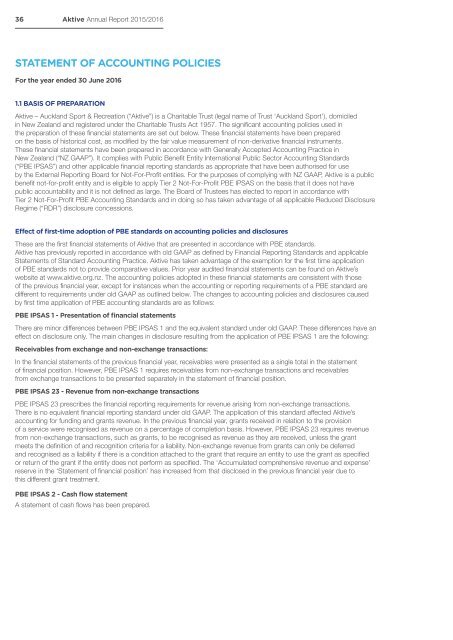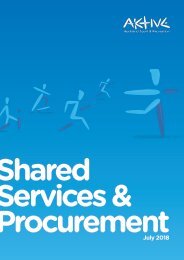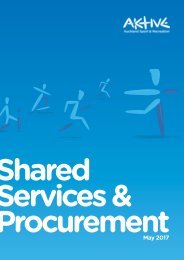Aktive Annual Report 2015/16
Create successful ePaper yourself
Turn your PDF publications into a flip-book with our unique Google optimized e-Paper software.
36 <strong>Aktive</strong> <strong>Annual</strong> <strong>Report</strong> <strong>2015</strong>/20<strong>16</strong><br />
STATEMENT OF ACCOUNTING POLICIES<br />
For the year ended 30 June 20<strong>16</strong><br />
1.1 BASIS OF PREPARATION<br />
<strong>Aktive</strong> – Auckland Sport & Recreation (“<strong>Aktive</strong>”) is a Charitable Trust (legal name of Trust ‘Auckland Sport’), domiciled<br />
in New Zealand and registered under the Charitable Trusts Act 1957. The significant accounting policies used in<br />
the preparation of these financial statements are set out below. These financial statements have been prepared<br />
on the basis of historical cost, as modified by the fair value measurement of non-derivative financial instruments.<br />
These financial statements have been prepared in accordance with Generally Accepted Accounting Practice in<br />
New Zealand (“NZ GAAP”). It complies with Public Benefit Entity International Public Sector Accounting Standards<br />
(“PBE IPSAS”) and other applicable financial reporting standards as appropriate that have been authorised for use<br />
by the External <strong>Report</strong>ing Board for Not-For-Profit entities. For the purposes of complying with NZ GAAP, <strong>Aktive</strong> is a public<br />
benefit not-for-profit entity and is eligible to apply Tier 2 Not-For-Profit PBE IPSAS on the basis that it does not have<br />
public accountability and it is not defined as large. The Board of Trustees has elected to report in accordance with<br />
Tier 2 Not-For-Profit PBE Accounting Standards and in doing so has taken advantage of all applicable Reduced Disclosure<br />
Regime (“RDR”) disclosure concessions.<br />
Effect of first-time adoption of PBE standards on accounting policies and disclosures<br />
These are the first financial statements of <strong>Aktive</strong> that are presented in accordance with PBE standards.<br />
<strong>Aktive</strong> has previously reported in accordance with old GAAP as defined by Financial <strong>Report</strong>ing Standards and applicable<br />
Statements of Standard Accounting Practice. <strong>Aktive</strong> has taken advantage of the exemption for the first time application<br />
of PBE standards not to provide comparative values. Prior year audited financial statements can be found on <strong>Aktive</strong>’s<br />
website at www.aktive.org.nz. The accounting policies adopted in these financial statements are consistent with those<br />
of the previous financial year, except for instances when the accounting or reporting requirements of a PBE standard are<br />
different to requirements under old GAAP as outlined below. The changes to accounting policies and disclosures caused<br />
by first time application of PBE accounting standards are as follows:<br />
PBE IPSAS 1 - Presentation of financial statements<br />
There are minor differences between PBE IPSAS 1 and the equivalent standard under old GAAP. These differences have an<br />
effect on disclosure only. The main changes in disclosure resulting from the application of PBE IPSAS 1 are the following:<br />
Receivables from exchange and non-exchange transactions:<br />
In the financial statements of the previous financial year, receivables were presented as a single total in the statement<br />
of financial position. However, PBE IPSAS 1 requires receivables from non-exchange transactions and receivables<br />
from exchange transactions to be presented separately in the statement of financial position.<br />
PBE IPSAS 23 - Revenue from non-exchange transactions<br />
PBE IPSAS 23 prescribes the financial reporting requirements for revenue arising from non-exchange transactions.<br />
There is no equivalent financial reporting standard under old GAAP. The application of this standard affected <strong>Aktive</strong>’s<br />
accounting for funding and grants revenue. In the previous financial year, grants received in relation to the provision<br />
of a service were recognised as revenue on a percentage of completion basis. However, PBE IPSAS 23 requires revenue<br />
from non-exchange transactions, such as grants, to be recognised as revenue as they are received, unless the grant<br />
meets the definition of and recognition criteria for a liability. Non-exchange revenue from grants can only be deferred<br />
and recognised as a liability if there is a condition attached to the grant that require an entity to use the grant as specified<br />
or return of the grant if the entity does not perform as specified. The ‘Accumulated comprehensive revenue and expense’<br />
reserve in the ‘Statement of financial position’ has increased from that disclosed in the previous financial year due to<br />
this different grant treatment.<br />
PBE IPSAS 2 - Cash flow statement<br />
A statement of cash flows has been prepared.
















